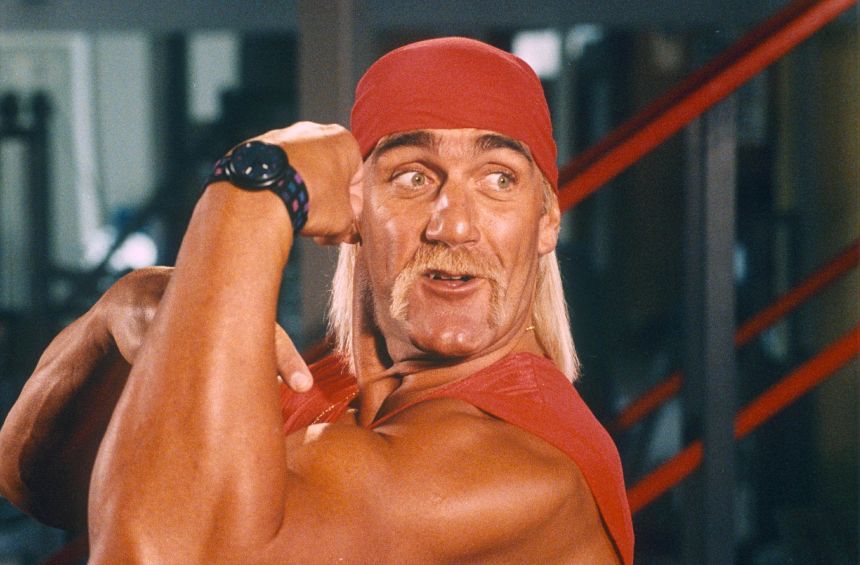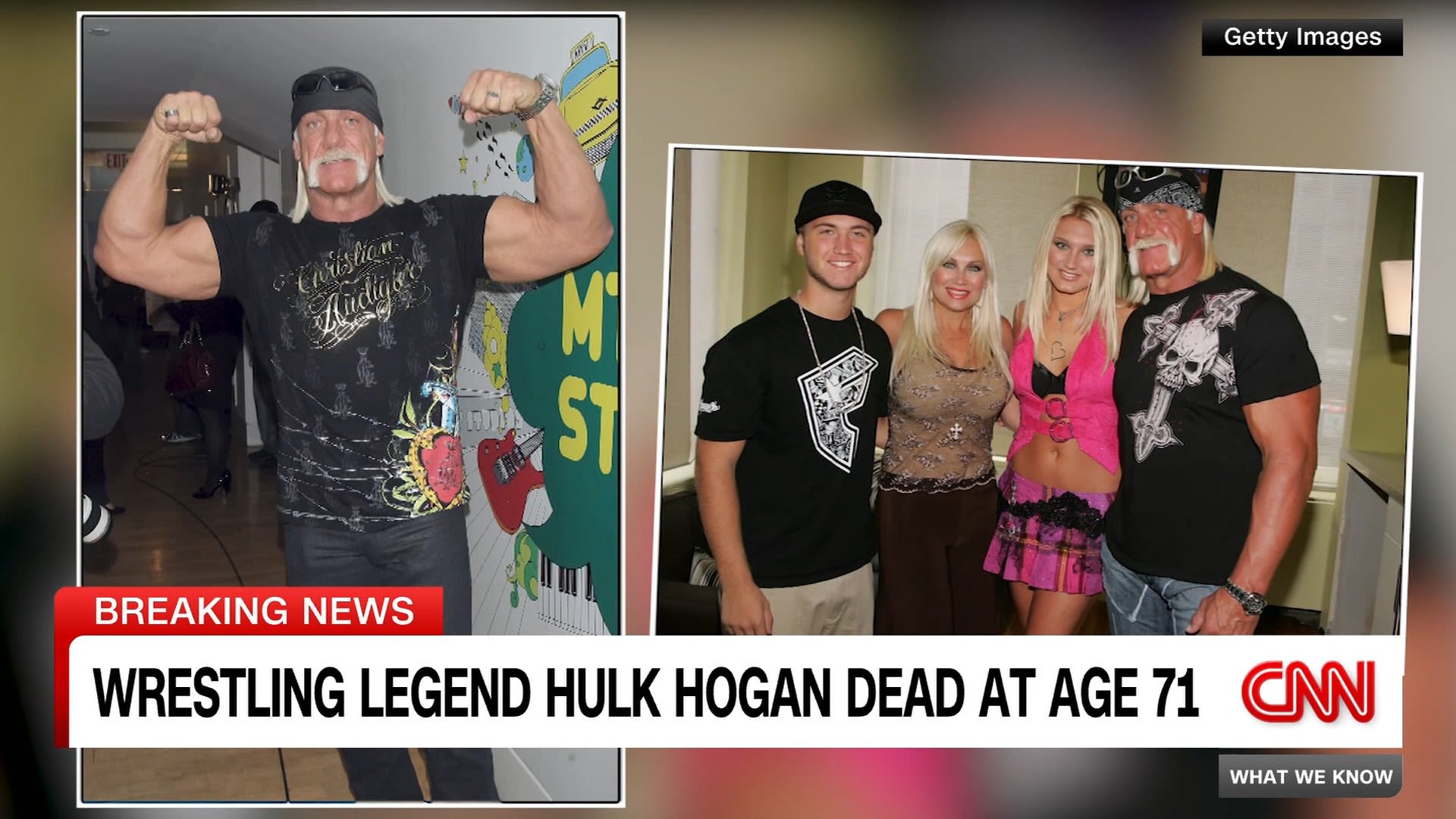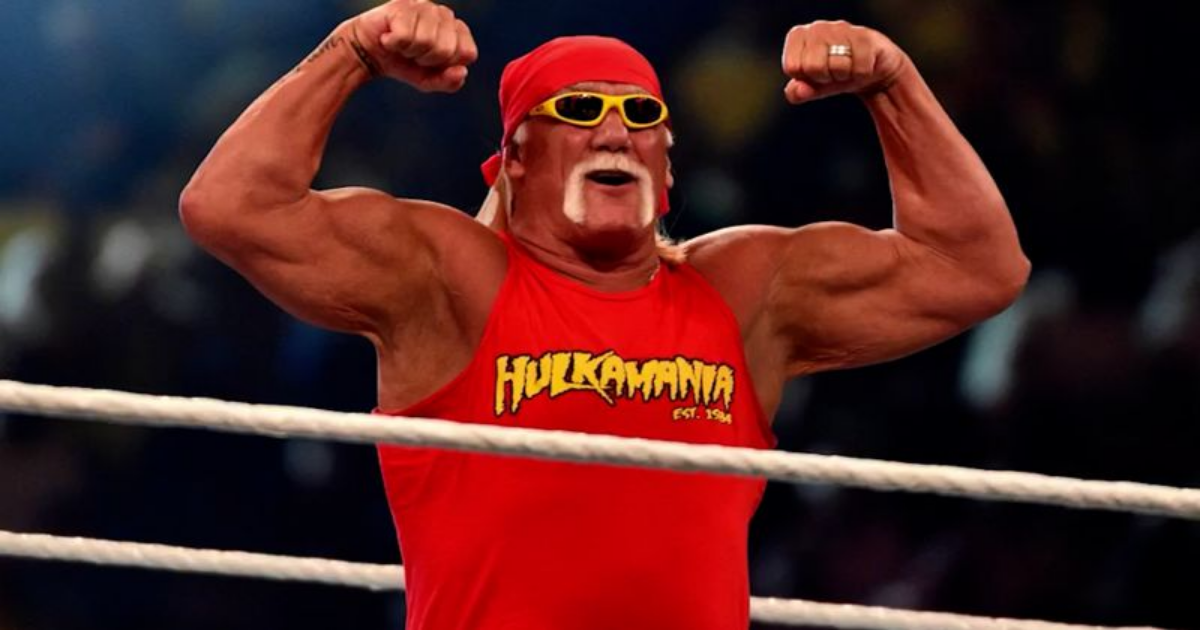One of my earliest memories is standing in the living room of a small house in Garden City, Michigan, mimicking Hulk Hogan’s pose down to my laughing parents.
Any wrestling fan knows the rhythm: Flex one arm while pointing to the side with your other, then turning 90 degrees to show off both biceps before turning back square to the audience and bending your arms at a right angle to flex your chest and arms repeatedly. Maybe you’d rotate your hand a few times before cupping it to your ear to hear the cheers as well.
For me, the crowd was my mom and dad who couldn’t get over how their toddler looked trying to mimic this behemoth of a wrestler. For Terry Bollea, the crowd was millions of little kids like me who believed he was the embodiment of good, the hero who would always save the day. He told us to “train, say our prayers, eat our vitamins, be true to yourself, true to your country and be a real American.”
When you’re three or four years old, that’s about as pure as it gets. Hulk Hogan wasn’t just a wrestler to young wrestling fans in the early 1990s. He was a role model. He was a hero.
That’s what made his villainous turn in the mid-1990s so effective. Hulk Hogan, of all people, being a bad guy? I had fallen out of wrestling at that point, but when 10-year-old me started watching again, I couldn’t reconcile it. I hated him, even if I was massively entertained by him. The man that little me idolized was evil now? How dare he!
A few years later, when he had returned to his home in WWE and once again became the hero we always believed in, it was exhilaratingly perfect. It was like Darth Vader striking down the Emperor at the end of “Return of the Jedi.” We knew there was good in him – red-and-yellow good, the hero we wanted to cheer like we did when we were kids. Deep down, inside of every wrestling fan of a certain age, there was an almost primal need to love and cheer for the Hulkster.
Whether Bollea wanted it or not, that’s what he carried on his back: The innocence of millions upon millions of little Hulkamaniacs’ childhoods. Hulk Hogan was superhuman, infallible – as WWE so often said, he was “the Immortal Hulk Hogan.”
Bollea was anything but. One of the most heartbreaking things about growing up and becoming an adult is realizing that your infallible role models are just as human and as flawed as everyone else – sometimes more so in the slightly unhinged world of professional wrestling.
At some point, every kid realizes that the professional wrestling they’re watching on TV isn’t on the up-and-up. It’s brilliant theater, a violent soap opera that never ends. But it’s also predetermined. And the performers in the ring are working together, not against one another. That’s the first lesson that’s hard to take because when you’re a kid, you believe so hard that it’s real.
The next thing you learn is that the characters on TV and in the ring are just that: characters. The men and women who become those characters aren’t always what you hoped they’d be.
For millions of us, that became clear when we heard Bollea on tape using racial slurs and saying awful things regarding his daughter’s dating life. Reconciling the man we heard on the tape with the character we had grown up with wasn’t easy. It broke a lot of fans’ hearts.
In the wake of the tape being released, Bollea was ex-communicated by WWE and the wider professional wrestling world. It was a little bizarre – how does arguably the biggest, most important star in wrestling’s history simply get deleted from its annals?
Turns out, he doesn’t. In 2018, Bollea was reinstated to WWE’s Hall of Fame – to the chagrin of some of the Black wrestlers in the company. In 2019, he was back on its programming.
While he apologized to the locker room, he also included a piece of advice that rubbed some members of the roster the wrong way.
“Now, I want to let you guys know that this is the biggest spotlight in the world,” Bollea said on “The Apter Chat” podcast, recounting his speech. “The WWE’s the biggest spotlight in the world. And if you’re a little, teeny star, don’t even slip on a banana peel when you’re a little star here because you’re in the spotlight. Try not to make any mistakes like I made.
“But when you’re a big star here and you make a mistake, the whole world is gonna know. You’ll be on the front page of every newspaper, of every magazine – just like it happened to me. I made a mistake, and this machine was so big and the WWE’s made me such a big star that everybody knows what’s going on. So please be careful because people have cell phones and cameras and just be careful.”
Thaddeus Bullard, also known as Titus O’Neill in the WWE, was among the members of the company who weren’t happy with how Bollea conveyed his message, construing it as Bollea saying he was upset he got caught, rather than apologizing for his words (something that Bollea vehemently denied).
“What I don’t support was the apology that was given in regards to the words and the actions that he exhibited years ago,” Bullard said in a 2019 appearance on the “Busted Open Radio” podcast.
“To me, when you have true remorse for being sorry about doing something, it’s pretty simple. You don’t have to be prepped to say certain things and you definitely don’t want to make excuses. I just feel like the inconsistencies to the time that it came out to last week were so across the board were just like – sitting there, it was uncomfortable for me. I want to give the character, Hulk Hogan, a chance and the man, Terry Bollea, a chance to redeem himself.
“He truly let a lot of folks down, both White, Black and everything in between.”
Thaddeus Bullard, also known as Titus O’Neill, professional wrestler
The whole episode left a sour taste in fans’ mouths for years.
When Bollea appeared as Hulk Hogan on WWE television after his reinstatement, the reception was mixed at best. It wasn’t helped by scores of stories – told in so-called “shoot interviews” in which wrestlers pull back the curtain and tell the behind-the-scenes tales of how the professional wrestling sausage gets made – shared in his later years that gave Bollea the image of a backstage politician who was always doing whatever he could to make sure he came out on top.
It all came together to complicate the image of a man whose wrestling character was so successful because he was so simple. Hulk Hogan was all that was good – until he became “Hollywood” Hulk Hogan and became all that was evil. That’s why Hulk Hogan worked and what made the character arguably the most successful, most influential and most iconic in wrestling history.
But it is a sad reality that his last ever appearance on WWE’s TV will be on January 6’s debut of “Monday Night Raw” on Netflix. The audience at that point only saw Bollea, not the Hulkster – and booed him mercilessly as he tried to cut one of his signature promos.

It’s a long way from how Hulk Hogan made us feel when he “hulked up,” using one last burst of adrenaline to fend off a bad guy, hitting him with a few punches, a big boot and then the signature leg drop to win a match. It was simple, electrifying, defiant stuff. It was everything pro wrestling should be. That sequence, and the feeling it gave millions upon millions upon millions of people, is why Hulk Hogan will forever be mentioned among the all-time greats in his field.
Ultimately, Terry Bollea paid the price to be Hulk Hogan. He told Logan Paul on his “IMPAULSIVE” podcast last year that he had 25 surgeries in the last 10 years. He admitted to using steroids to be able to look like the massive owner of the “24-inch pythons” for arms that he promoted himself to be. In recent years, he made so many public appearances to promote his new beer, his new freestyle wrestling organization, and whatever else that he clearly was pushing it all the way until the end of his life.
Not that that was any different for the man who once (amazingly) claimed that he managed to work 400 times in a single year during his career because he traveled over the international date line between Japan and the US so many times.
Like so many professional wrestlers, Bollea gave wrestling fans every ounce of his body for their entertainment. But it’s undeniable that he also couldn’t live up to the lofty ideals that the Hulk Hogan character embodied during all those innocent years when we were wearing bandanas on our heads and trying to rip our shirts off to be like Hulk.

Wrestling icon Hulk Hogan dies at 71
3:17 – Source: CNN

It’s all just sad. I feel terrible for his kids, his wife, his family and friends. I feel terrible for the little kid inside of me who once dressed up as Hulk Hogan for Halloween. I feel terrible that the story of Bollea’s passing can’t be as simple and brilliant as the characters he played on TV.
Hulk Hogan will go down as one of the greatest heroes and villains in wrestling history. Hulk Hogan brought wrestling mainstream and changed the game for generations to come. Hulk Hogan is an icon, a flamboyant and charismatic legend who will live on forever – truly immortal. Terry Bollea’s legacy is far, far more complicated.

